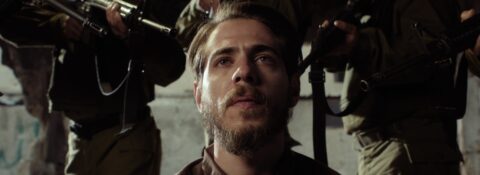Once Upon a Time in Gaza (Tarzan Nasser, Arab Nasser, 2025) starts five times. Firstly, with audio footage of Trump threatening to turn Gaza into the Arab Riviera; secondly, with members of Hamas carrying the body of a dead martyr and firing their guns into the air; thirdly, with footage of Gaza being levelled from the sky by Isreali rockets; fourthly, with the trailer from a fiction movie touting itself as the first action movie made in Gaza; before fifthly, finally, taking us to Gaza, 2007, and starting with the actual characters that comprise the film.
This uneven, insecure beginning, while undoubtedly highlighting that the current issues Gaza faces are rooted in conflict and occupation dating back almost two decades already1Or since time immemorial, to be honest. — perhaps stemming from Hamas taking over the area all the way back in June 2007 — is characteristic of the inherent messiness of the Nassar brothers’ approach, with their latest work failing on both a narrative and thematic level, unable to settle on a consistent and meaningful tone.
Majd Eid stars as Osama, a falafel shop owner with a side hustle in reselling fraudulently obtained prescription drugs. He works alongside the sensitive and quiet Yahya (Nader Abd Alhay), who dreams of a life outside of Gaza but has had his application to leave the area denied by the Israelis. Meanwhile, Netanyahu’s regime ramps up the dangerous rhetoric about Gazans while a wall is being built around the entire region, essentially locking the Palestinian people in.
It is within this deeply oppressed world that corruption flourishes, with local cop Abou Sami (Ramzi Maqdisi) constantly shaking Osama down to reveal the names of his previous associates. But it is also a place with manifold creative expression, the video camera often as powerful as the rifle in providing resistance against the Israeli regime. Soon, the lines between reality and fiction meld as Yahya is roped into playing a martyr in a low-budget film.
I’m not sure about this one. The lighting and cinematography look cheap, giving off a straight-to-VOD vibe while the blasting Nino Rota-esque score — trumpet-heavy waltzes abound — distracts from the subject at hand. The disjointed structure doesn’t help much either, the Nasser brothers’ unable to get the audience invested in the urgency of the tale or in the plight of its characters.
And that ending! While it makes sense on a satirical note, it appears to indulge in one of the most odious conspiracies about Palestinians that Zionists themselves use. Whether or not this is intentional, making this kind of statement at this moment in history feels deeply unfortunate. While Gaza needs as many stories as possible right now, this one doesn’t feel like it’s helping.
Redmond is the editor-in-chief of Journey Into Cinema.





